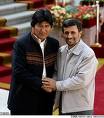
2030 GMT: El Baradei's Clues. Want to know the state of the nuclear talks with Iran? The head of the International Atomic Energy Agency, Mohammad El Baradei, offers all the necessary hints
in an interview with Reuters.
1. Iran's "swap" proposal, exchanging 20% enriched uranium for Iranian 3.5% stock inside the country, is not acceptable. "They are ready to put material under IAEA control on an (Iranian) island in the Persian Gulf. But the whole idea as I explained to them, to defuse this crisis, is to take the material out of Iran. I do not think (Iran's counter-proposal) will work as far as the West is concerned."
NEW Iran : Why Keep On Analysing a “Dysfunctional” Government?
NEW Latest Iran Video: Iran’s Students Speak to Counterparts Around the World
Iran: While the President’s Away…..The Contest Inside Tehran’s Establishment
The Latest from Iran (24 November): A Larijani-Rafsanjani Alliance?
To back his line, El Baradei is playing up uncertainty over the state of Iran's nuclear plans, pivoting on the controversy over the second enrichment plant at Fordoo: "You cannot really use it for civilian purposes. It's too small to produce fuel for a civilian reactor." So while the IAEA has "no indication that there are other undeclared facilities in Iran" or "any information that such facilities exist", Fordoo's existence raises questions about a wider Iranian programme --- questions that El Baradei can use (or create) to push back the "swap" initiative.
Iranian state media has already reacted: "IAEA fails to address Iran nuclear swap concerns". But this pretty much puts an end to Tehran's offer: if El Baradei won't back it, then it's almost certain none of the "5+1" powers will be offering any support.
2. But the talks are still very much alive, resting on a "third-party enrichment" arrangement. The plan would be one in which the IAEA would "take custody and control of the material. We've offered also to have the material in Turkey, a country which has the trust of all the parties.... I am open (to Iranian amendments) if they have any additional guarantees that do not involve keeping the material in Iran."
3. So, for now, El Baradei does not see a move to aggressive sanctions: UN resolutions are mainly "expressions of frustration".
Summary? Ball's in your court, President Ahmadinejad (and Supreme Leader Khamenei). Don't knock it back --- take a modified "third-party enrichment" offer and everyone will be happy.
1955 GMT: The Khatami and Mousavi Statements. Former President Mohammad Khatami has also issued a statement for Basiji week. He used the occasion to criticise both the specific oppression of dissenters --- "These days, honest and truthful people are being oppressed and worse than that all these are being done in the name of Islam and the revolution" --- and the general mismanagement of the Government --- "An unbiased view is that all areas of industry, agriculture, foreign affairs and different managements are in bad shape and all indexes have decline and the country has fallen behind." He continued to emphasise the hope for "a change in the country’s atmosphere" through an adherence to the Constitution".
And to summarise the Mousavi statement (see 1610 GMT): "What shaped Basij in the beginning of the revolution was pure ideas not weapons and military power that raised it to high statures....The goal of Imam Khomeini in creating Basij was to include all or at least a significant majority of the public by not belonging to a particular idea."
Now, however, the Basij "take orders with closed eyes and break tthe arms and legs of their religious brothers and sisters". They need to recognise that those who use lies as "their main political tactic...Following these people is not the righteous path."
At the end of the statement, Mousavi seizes the nationalist mantle and turns the charge of "foreign intervention" against the regime: If terrorising people succeeds, "the country will fall into the hands of foreign invaders".
1905 GMT: Here is Why There Won't Be Tough Sanctions. "The Chinese refiner Sinopec has signed a memorandum of understanding with the National Iranian Oil Refining and Distribution Company to invest $6.5 billion for building oil refineries in Iran. It is predicted that the two sides will close the deal in the next two months."
1850 GMT: Iranians' Civil Rights Violated (outside Iran). Forgive me for finding this story ironic as wel as serious: "An Iranian NGO (non-government organisation RahPouyan-e-DadGostar) is in the process of logging a legal complaint against the US over its violation of the rights of Iranian detainees."
Without dwelling on the case of Kian Tajbakhsh, the Iranian-American recently jailed for 15 years after a televised "confession" over his supposed role in velvet revolution, I'll note the possible significance that several of the 11 Iranians listed in the report have been connected to possible Israeli and/or US plots to abduct individuals connected with Iran's nuclear programme.
1840 GMT: A month after Iran's Ministry of Education announced a plan to permanently assign a member of the clergy to each school to “fulfill the cultural needs” of students, a religious official has stated that management of Iranian public schools is being transferred to seminaries. Ali Zolelm, the head of the Council of Cooperation between Ministry of Education and the seminaries, saying that seminars have already taken over school management in several provinces and the city of Qom.
1740 GMT: Larijani Keeps Up the Pressure. Speaker of Parliament Ali Larijani, speaking in Tehran, has launched another assault on Iran's nuclear talks with the US, claiming that Washington wanted to deceive the Iranian Government:
Analyzing the U.S. (role) in the nuclear issue shows that there was a trickery in this (deal) proposal (brokered by the International Atomic Energy Agency). They (Americans) thought that, using a kind of rhetoric, they can cheat politically," Larijani said addressing a gathering in Tehran, without specifying how the United States has tried to cheat Iran.
1610 GMT: Why Mousavi's Statement (see 1345 GMT) is Significant. An EA correspondent drops by:
Mousavi's latest communique isn't worth noting for its content --- it is a rather stale critique of current basij actions and dubious nostalgic take on the "good old days" of his premiership, when political repression was far higher than now.
What is remarkable is the coordination between Mousavi and Ayatollah Khomeini's bay foundation, run by his nephew Hassan. Mousavi's thoughts regarding the old vs new basij are almost identical to a similar article which appeared yesterday on the Jamaran website, run by the foundation. [Note: Mousavi's latest Internet interview was with Jamaran. -- SL]
This is yet another indicator that Khomeini's family have more than ever thrown their weight behind the reformists, no doubt a significant support in a clannish political system where familial ties are still a key yardstick of political interaction.
1345 GMT: Mousavi and the Basiji Celebrations. Mir Hossein Mousavi has used the occasion of the 30th anniversary of the Basiji movement
to address the militia in his Statement No. 15. We're looking for an English translation.
1135 GMT: An Outstretched Hand (But You're Still Losers).
The Supreme Leader said Wednesday in a televised speech, "Those who are deceived by a smile or applause by the enemy and try to confront the establishment and constitution should know that their efforts are futile."
Ayatollah Khamenei, backing President Ahmadinejad, said the opposition should not be branded as "hypocrites...just because they do not say what we say".
1130 GMT: Inspired by Marjane Satrapi's graphic memoir
Persepolis, activists have published
a Web update on the June election and the protests up to 21 June. All the drawings are from the original memoir except for one --- on the role of Twitter in the demonstrations.
1040 GMT: Trashing Neda. The commander of the Basiji militia, Mohammad Reza Naqdi, has marked this week's celebrations of his organisation by headlining
the "real" story on the killing of Neda Agha Soltan. A "person from America" shot Neda as part of a plot in which the Iranian regime would be blamed for her death.
0930 GMT: The reformist website
Rooz Online has published
an English-language version of the speech of MP Ali Reza Zakani
to which we have paid great attention. The summary is still garbled in places but it seems clear from this version that
Zakani's primary targets, are not President Ahmadinejad and his inner circle but Speaker of the Parliament Ali Larijani, former President Hashemi Rafsanjani, and those ministries like Interior and Intelligence whom Ahmadinejad has seen as post-election obstacles.
Specifically, I now think Zakani's references to the eve-of-election polls that indicated a close race between Ahmadinejad and Mir Hossein Mousavi are not, as I first misread (and as
Rooz now misreads in its headline), an attack on the President's legitimacy. Instead, they put blame at the feet of Iranian ministries (and implicitly Larijani) who spread the polls and thus fed the notion of electoral "fraud" after Ahmadinejad's victory.
0825 GMT:
The New York Times reveals that President Obama, on the eve of Mahmoud Ahmadinejad's visit to Latin America, wrote a three-page letter to Brazilian President Luiz Inacio Lula da Silva. Obama signalled his hope that Da Silva would back the US-led Vienna proposal for "third-party enrichment" of Iran's uranium.
More significant than the letter or indeed Da Silva's public response, balancing support for international efforts with a declaration of faith in Iran's "peaceful" programme is the leaking of the news by two Administration officials. This indicates that Washington still considered the discussion with Tehran "live", including Iran's tabling of its still-private response to the International Atomic Energy Agency.
0730 GMT: We've begun this morning by posting
a video from Iranian students to international colleagues and
a response to a reader's question, "Why do we keep analysing this dysfunctional Government?"
Of course, President Ahmadinejad is not admitting to dysfunction. Instead he is offering the globe-trotting sign that All is Well. After his visits to Gambia and Brazil yesterday, he had
a stop-over in Bolivia, where he got a warm reception from a small group of Bolivian Muslims and a show of support for Iran's nuclear position and praise of Iranian-Bolivian links
from President Evo Morales. Then it was
off to Venezuela and another meeting with Hugo Chavez, a firm back of the Tehran Government.
And, in a signal of hyper-engagement, Iran
has revived its application for membership of the World Trade Organization, sending a summary of its commerce policies to the WTO.
 Sunday, November 29, 2009 at 8:42
Sunday, November 29, 2009 at 8:42  This article from Nick Baumann at Mother Jones is filled with political-insider information, but I think it is a significant marker of how the closure of the Guantanamo Bay detention facility has moved from an Obama pledge in January 2009 to a site for internal Administration struggle in November.
This article from Nick Baumann at Mother Jones is filled with political-insider information, but I think it is a significant marker of how the closure of the Guantanamo Bay detention facility has moved from an Obama pledge in January 2009 to a site for internal Administration struggle in November.

 2030 GMT: El Baradei's Clues. Want to know the state of the nuclear talks with Iran? The head of the International Atomic Energy Agency, Mohammad El Baradei, offers all the necessary hints
2030 GMT: El Baradei's Clues. Want to know the state of the nuclear talks with Iran? The head of the International Atomic Energy Agency, Mohammad El Baradei, offers all the necessary hints  On Tuesday, the Jerusalem Municipal Planning Committee
On Tuesday, the Jerusalem Municipal Planning Committee